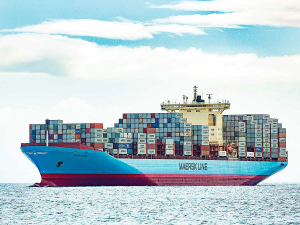First ever biofuel kiwifruit charter completed
Fresh Carriers Co. Ltd (FCC) and Zespri have completed the first ever kiwifruit charter powered by a low-emissions fuel.
 The shipping sector remains in the middle of a global disruption, and this is impacting on NZ exporters.
The shipping sector remains in the middle of a global disruption, and this is impacting on NZ exporters.
Global shipping disruption is continuing, with two out of every three ships caught in a 'traffic jam'.
Kotahi chief executive David Ross says the shipping sector remains "very much in the middle of global disruption".
Speaking at the NZ Primary Industries Conference in Auckland last month, Ross pointed out that some NZ trade lanes had lost 30% of capacity due to ships being caught in this traffic jam.
One of the key measures of global shipping is schedule integrity - how many container ships are arriving and departing on time against their published schedule.
Normally, shipping schedule integrity is around 80%, meaning four out of every five ships call in at the right time.
However, disruptions over the past three years have seen it drop below 30%, says Ross.
"It has picked up fractionally today and is sitting around 35%.
"So, it means two out of three ships globally are not on time. They are in a big shipping traffic jam at ports waiting to get serviced and get away and we lose capacity."
Ross says ships have a rotation, going around in a loop of 40- 49 day cycles, but if they are caught up in this traffic jam they don't do as many cycles in a year.
"Some of our trade lanes out of NZ have seen 25 to 30% of capacity disappear due to the ship being in the traffic jam."
This impacts delivery of containers back into NZ and feeding services to mainline vessels from place like Nelson where a lot of small horticulture exporters are based.
Ross says the situation remains tricky and hasn't got much better.
T&G group shipping manager and chair NZ Council of Cargo Owners, Simon Beale, told the conference that the shipping traffic jam is affecting major port cities around the world.
In the US, ships are waiting for 40 days before getting a berth at Los Angeles Port. Fortnightly sailings from NZ to Seattle Port have now stretched to six-weekly sailings.
He says getting empty containers to regional ports like Nelson where there is a huge pipfruit industry gets challenging.
"People are carting products down to Lyttelton. They are moving product all around the country just to get product out."
Zespri's head of NZ supply Jason Te Brake expects the shipping challenges to remain fro the next 12 to 18 months.
"There may be cautious optimism but the next season will be another challenge," he says.
He says Zespri managed to get all its fruit shipped this season. Te Brake puts this down to its partnerships with charter vessels. About 50% of Zespri kiwifruit are shipped on chartered vessels. Te Brake says charter vessels also face challenges like labour shortages to discharge cargo at some ports.
"It's a tough environment but we leverage off a resilient team and our partnerships with long term charter providers and container vessel lines.
"We got all our fruits shipped this season."
Grace Su, a recent optometry graduate from the University of Auckland, is moving to Tauranga to start work in a practice where she worked while participating in the university's Rural Health Interprofessional Programme (RHIP).
Two farmers and two farming companies were recently convicted and fined a total of $108,000 for environmental offending.
According to Ravensdown's most recent Market Outlook report, a combination of geopolitical movements and volatile market responses are impacting the global fertiliser landscape.
Environment Canterbury, alongside industry partners and a group of farmers, is encouraging farmers to consider composting as an environmentally friendly alternative to offal pits.
A New Zealand dairy industry leader believes the free trade deal announced with India delivers wins for the sector.
The Coalition Government will need the support of at least one opposition party to ratify the free trade deal with India.